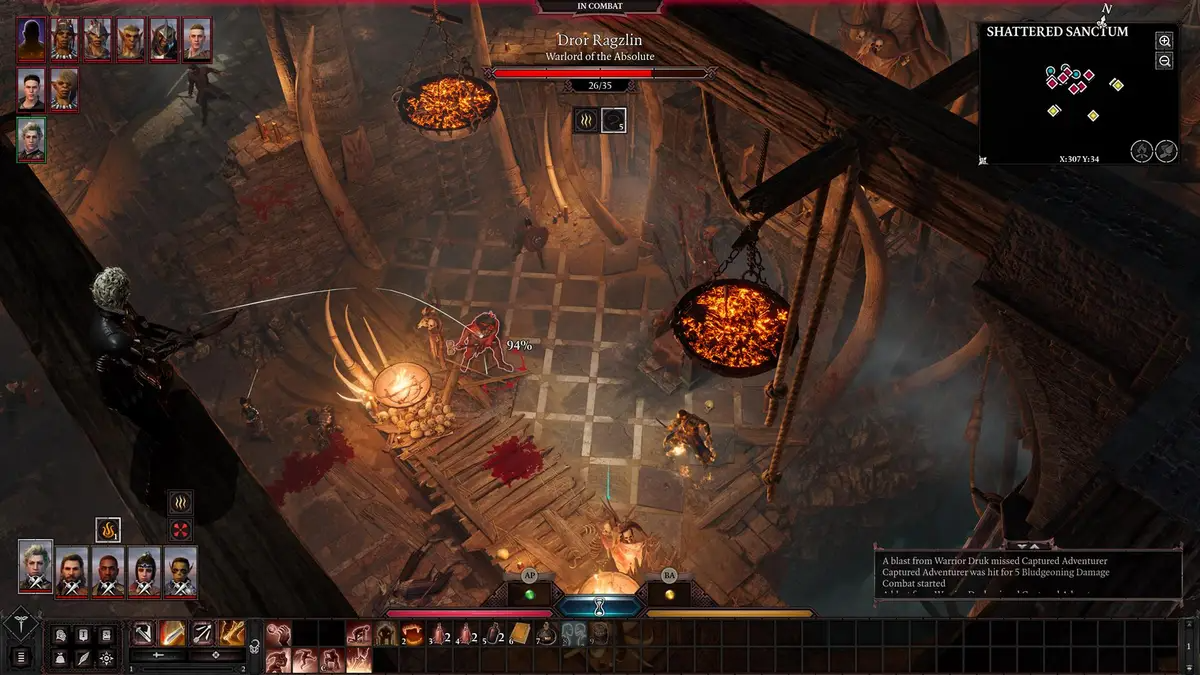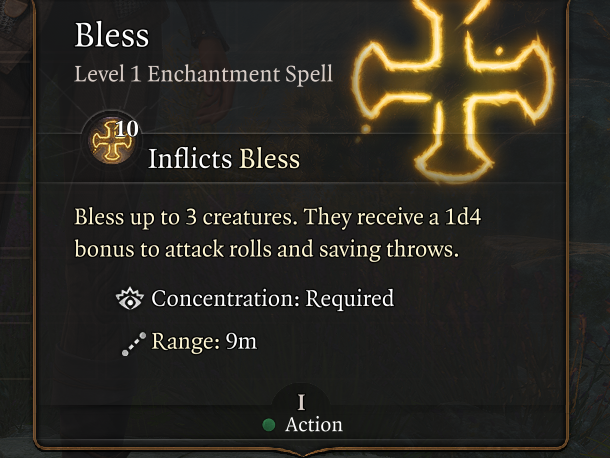One of the most common problems that players run into in Baldur’s Gate 3 is finding that far too many of their attacks miss their target. This seems to apply to melee and ranged weapons, and spells too, and can make combat much more difficult and frustrating. It can really spoil the excitement of your supposedly powerful characters when they seem to spend most of their time fumbling and missing the enemies.
Luckily there are some things you can do to reduce the rate at which this will happen. In this short guide, we will explain why attacks miss in Baldur’s Gate 3, and what you can do to stop it from happening.
Why are my Attacks Missing in Baldur’s Gate 3?
There are two basic concepts to understand about the combat in Baldur’s Gate 3 – Attack Rolls and Armour Class.
Every time you make an attack, you roll a die from 1-20. This is called an Attack Roll. In simple terms, the result of this roll needs to match or exceed the enemy’s Armour Class in order for the attack to hit.
While this initially sounds like some awful RNG, don’t worry just yet – there are a lot of things you can do to manipulate things in your favour. The dice roll is just the basic part of the Attack Roll, and whatever number it returns can be added to (or subtracted from) by various factors, and these are things that you usually can control.
Below we will go through all of these different factors, and how you can use them to maximise your hit chance.
How to Stop Attacks Missing in Baldur’s Gate 3
There are several factors that can cause a value to be added onto or subtracted from your Attack Rolls in Baldur’s Gate 3. Taking control of these factors is the best way to prevent your attacks missing. Below are all the things to keep in mind when playing the game. You might not be able to have all of these things in your favour all the time, but learning them and looking out for them in game will make your combat experience much more enjoyable.
Ability Score Modifiers
This is the most important thing to understand, since it’s something that always applies regardless of the situation.
Different types of attacks in Baldur’s Gate 3 use different Abilities to determine your Ability Score Modifier:
- Martial Weapons use Strength
- Finesse and Thrown Weapons use Strength or Dexterity, whichever is higher.
- Spells use Intelligence, Wisdom or Charisma depending on your Class
Every two points above 10 that you have in an Ability, the respective Ability Modifier will be increased by +1 (the same applies in reverse if your Ability is below 10).
For example, if my character has 12 Strength and swings a Greatsword at an enemy, a modifier of +1 will be added to the Attack Roll. If my Strength is 14, it will be +2, and so on.
If this seems a bit complicated, then the most important thing to understand is that you should figure out which ability (or abilities) your character is using for their attacks, and increase them as much as possible to maximise your Ability Modifier.
Advantage and Disadvantage
This is one of the more tactical parts of Baldur’s Gate 3’s combat. Various situations can cause you to have an Advantage or a Disadvantage on your Attack Rolls against a particular enemy, thus impacting your hit chance.
Examples of situations that give you an Advantage are:
- Attacking a Restrained enemy
- Attacking from Stealth (or when otherwise undetected by the target)
- Using Spells and Abilities that give you Advantage, such as Guiding Bolt
On the other hand, these situations can give you a Disadvantage:
- Making any Ranged attack against an enemy within 1.5 metres of you
- Attacking an enemy obscured by Darkness
- Falling victim to a Spell or Ability that imposes Disadvantage
Keep an eye out for ways to gain Advantage in combat, and avoid situations that put you at a Disadvantage. This is a great way to increase your hit chance markedly.
High and Low Ground
This is a very simple mechanic, but keeping it in mind can considerably improve your hit chance in many situations.
In short, attacking from a higher position than your target adds +2 to your Attack Roll. Attacking from a lower position instead subtracts -2. The height difference must be at least 2.5 metres for this to take effect, and therefore this mechanic usually only applies to ranged attacks.
Try to scout out the area before a tough fight, and look for positions that will give you the height advantage over your enemies. Remember that the same rules apply to enemy attacks too, so try to avoid letting them get the high ground over you. The image below shows a Ranger character attacking from the high ground.
Proficiency Bonus
When choosing a weapon for your character, make sure you are Proficient with the weapon type before using it. The weapon tooltip will warn you with a “Not Proficient” message if you’re looking at a weapon that you lack proficiency for.
When using a weapon that you do have Proficiency with, you will have a Proficiency Bonus added to all of your Attack Rolls with that weapon. The exact number depends on your character level:
- Level 1-4: +2 bonus
- Level 5-8: +3 bonus
- Level 9-12: +4 bonus
Your weapon Proficiencies are generally sourced from your chosen Race and Class.
Spells
There are a few spells in the game that can give you and your party a bonus on Attack Rolls. The most important one is the Bless spell, available to Clerics and Paladins in Baldur’s Gate 3. It grants up to a +4 bonus to Attack Rolls while active. It’s highly advisable to have a Cleric or a Paladin in your party to gain access to this spell, as it will greatly improve your hit chances.
Conditions
Technically, the Bless spell mentioned above works by granting the Blessed Condition to the allies targeted by the Spell.
There are many other Conditions in the game that can be given to friends and foes, and many of these Conditions can have a positive or negative impact on Attack Rolls. Some of the most useful Conditions for improving your Hit Chance are:
- Acid – Covering your enemy in Acid reduces their Armour Class by 2, which will increase the chance of your Attack Roll exceeding their Armour Class, resulting in a hit.
- Blinded – Attack Rolls against Blinded creatures will have an Advantage.
- Ensnared – Attack Rolls against Ensnared creatures have Advantage. Rangers and Paladins can Ensnare enemies with the Ensnaring Strike spell.
- Entangled and Enwebbed – These basically work in the same way as Ensnared
- Faerie Fire – A spell available to the Drow race. Attacks against creatures with this condition have Advantage.
- Paralysed – Attacks against a Paralysed creature have Advantage.
On the contrary, here are some Conditions that can decrease your Attack Rolls (or that of your enemies):
- Bane – Bane is basically the opposite of Bless, subtracting up to -4 from Attack Rolls of those affected.
- Blinded – If you are Blinded, your Attack Rolls have Disadvantage.
- Blurred – Attacks against a Blurred target have Disadvantage.
- Frightened – Frightened creatures have a Disadvantage on their Attack Rolls.
- Heavily Encumbered – If you’re carrying too much in your inventory, your Attack Rolls will suffer Disadvantage.
- Threatened – Ranged Attack Rolls have Disadvantage if an enemy is too close.
Please note that these lists are not exhaustive, there are many different Conditions in Baldur’s Gate 3 that can improve or worsen Attack Rolls of friends and foes alike. Keep an eye out for ways to manipulate these to your advantage – it’s absolutely worth having someone in your party cast spells that give Advantage to subsequent Attack Rolls.
Weapon Enchantments
Sooner or later you will encounter Enchanted Weapons in Baldur’s Gate 3. These will have names similar to “Longbow +1”.
The +1 in the name indicates that Attack Rolls with the weapon are improved by +1, and the maximum possible Damage Roll is also increased by +1. The highest possible Enchantment effect is +5.
Archery Fighting Style
This only applies to the Fighter and Ranger classes. These Classes need to choose a Fighting Style, and they can get a +2 bonus to their ranged Attack Rolls by choosing the Archery Fighting Style.
This is absolutely worth doing for Rangers. You may want to consider it on your Fighter too if you find yourself using a bow very often.
Conclusion – Why do my Attacks miss in BG3
To stop your attacks from missing in Baldur’s Gate 3, it’s important to be aware of all of the factors mentioned above and be on the lookout for ways to include as many of the positive ones as possible, while avoiding the negative ones.
Remember that after the die is rolled as you attack an enemy, all of these factors are added to or subtracted from the die roll to calculate your final Attack Roll value. This final value must not be less than the target’s Armour Class value, or the attack will miss.
For example: If I’m a Level 4 Ranger character shooting at a Goblin with an Armour Class of 13 and I only roll a 5, but I have 17 Dexterity (+3), I have the High Ground (+2), I have Shadowheart in my party casting Bless on me (+1-4), and I have Proficiency with my Longbow (+2), then I’m still going to score an Attack Roll of at least 13 and hit the Goblin in spite of the poor dice roll.
On a final note, if your dice rolls a 1 then all of the above bonuses are ignored and you’ll miss anyway – this is called a Critical Miss. On the contrary, if the dice rolls a 20 then you get a Critical Hit, and all Damage effects associated with the attack will be rolled twice.
I hope this helps you to have a more fun time with combat in Baldur’s Gate 3 and gain a better understanding of how to stop your attacks from missing the mark so often. Thanks for reading the “Why do my Attacks miss in BG3” guide.
Other Baldur’s Gate 3 Guides
- Bard Build – College of Lore
- Ranger Build – Hunter
- Monk Build
- Fighter Build – Battle Master
- Barbarian Build – Berserker
- Warlock Build – Great Old One
- Cleric Build – Light Domain
- Rogue Build – Thief
- Sorcerer Build – Wild Magic
- Wizard Build – Evocation School
- Paladin – Oath of Ancients
- More Baldur’s Gate Guides & Builds






